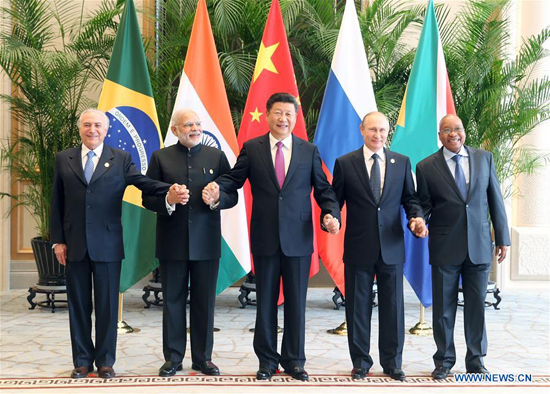BRICS should play bigger role in int'l affairs: Xi
|
|
|
Chinese President Xi Jinping (C), Indian Prime Minister Narendra Modi (2nd L), South African President Jacob Zuma (1st R), Brazilian President Michel Temer (1st L) and Russian President Vladimir Putin attend a BRICS leaders' meeting on the sidelines of a summit of the Group of 20 (G20) major economies in Hangzhou, capital city of east China's Zhejiang Province, Sept. 4, 2016. [Xinhua] |
Chinese President Xi Jinping said Sunday that BRICS members should enhance coordination to make emerging-market economies and developing countries play a bigger role in international affairs.
Since the beginning of this year, cooperation among BRICS countries -- Brazil, Russia, India, China and South Africa -- has maintained sound momentum with an expanded scope and more outcomes, Xi said while attending a BRICS leaders' meeting on the sidelines of a summit of Group of 20 (G20) major economies in Hangzhou.
BRICS nations are leaders among emerging-market economies and developing countries, and also important members of the G20, Xi said, noting that they should reinforce coordination to build, maintain and develop the BRICS and G20 platforms.
At the meeting, BRICS leaders exchanged views on a wide range of important global issues of common concern, including political, security, economic and global governance sectors.
Despite challenges in their respective economies, BRICS members recognized that they are still critical engines for global economic growth due to positive growth momentum and prospects, according to a statement issued after the meeting.
The nations should strengthen BRICS strategic partnership guided by principles of openness, solidarity, equality, mutual understanding, inclusiveness and win-win cooperation.
BRICS leaders appreciated the emphasis on development at the G20 under China's presidency, encouraging G20 members to strengthen macroeconomic cooperation, innovation, robust and sustainable trade, and investment growth, the statement said.
They also expressed concern about rising protectionism, against a backdrop of declining global trade, vowing to join efforts to facilitate market links and build an inclusive, rule-based and open world economy.
They said that International Monetary Fund (IMF) quotas fail to reflect current global economic realities, urging G20 members to step up efforts with the IMF to increase quota resources and review the distribution of quotas and votes to ensure a fair reflection of emerging and developing economies.
They called for the completion of 15th general review of quotas and the creation of a new quota formula before the 2017 IMF annual meeting, the statement said.
Xi called on the BRICS members to promote the reform of the governance structure of the IMF and the World Bank, with an aim to boost the representativeness and say of emerging-market and developing countries.
The five countries should also work to safeguard the position of multilateral trade system as the key channel, jointly build an open world economy and oppose all kinds of protectionism and exclusionism, to ensure that all countries will be equal in terms of development rights, opportunities, and rules, Xi said.
The president also called upon members of the emerging-market bloc to drive the BRICS New Development Bank to implement the first batch of projects and boost the bank's management level and financing capabilities.
The bank should promote the capabilities of macro research on the contingent reserve arrangement in order to enhance financial security for BRICS countries, he said.
The president called upon the emerging-market bloc to help build new-type international relations featuring win-win cooperation and cultivate a peaceful, stable, equitable and reasonable international order.
The BRICS members should insist that each country chooses its development path in accordance with its national conditions, and resolutely opposes the interference in its internal affairs by external forces, Xi said.
The president also called for increased cooperation in the fields of counter-terrorism, outer space, energy security, and cyber security under the framework of BRICS.
Coined by former Goldman Sachs chief economist Jim O'Neill in 2001 in a paper titled "Building Better Global Economic BRICs," the term "BRIC" was originally an acronym referring to Brazil, Russia, India and China.
In June 2009, leaders from the four countries held their first official meeting in Yekaterinburg, Russia, during which they founded a cooperative mechanism known as BRIC. In 2010, South Africa was officially admitted as a new member of the group, and the acronym was changed to BRICS.









Go to Forum >>0 Comments